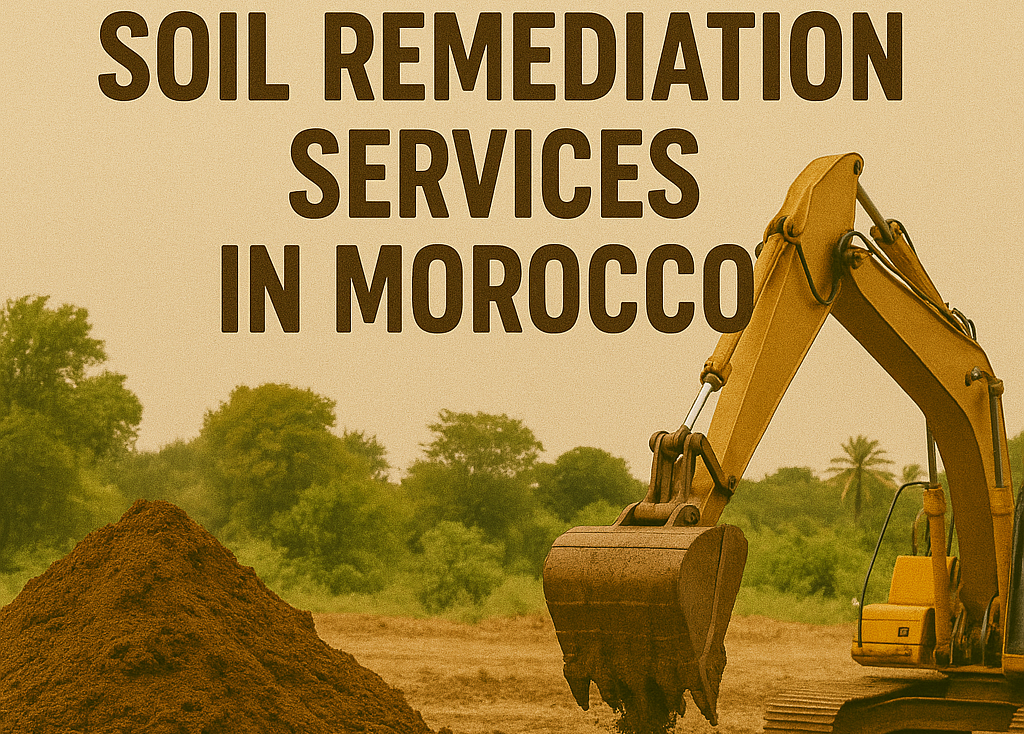Protecting Land and Water for a Sustainable Future
Introduction
Morocco, with its fertile plains, extensive coastline, and rapidly expanding urban and industrial centers, faces a growing challenge of soil and groundwater contamination. Agriculture remains a cornerstone of the economy, but intensive farming, phosphate mining, industrial activities, and unchecked urban growth are putting pressure on fragile soils and limited water reserves. From nitrate buildup in the Souss Valley to chemical waste around Casablanca and phosphate-related pollution in Khouribga, contamination is increasingly threatening food security, public health, and long-term sustainability.
At The Ground Water Company, we provide specialized soil remediation services across Morocco. Our mission is to rehabilitate contaminated land, safeguard aquifers, and support industries, municipalities, and communities in meeting environmental standards while contributing to Morocco’s sustainability and development goals.
What Is Soil Remediation?
Soil remediation is the process of cleaning up and restoring contaminated soil to make it safe for people, plants, and animals. It’s commonly used at sites where industrial activities, chemical spills, or improper waste disposal have polluted the ground.
In Morocco, the most common soil contaminants include:
- Petroleum hydrocarbons – from refineries, storage depots, and transport systems
- Heavy metals – linked to mining, metallurgy, and industrial discharges
- Chemical residues – from fertilizers, pesticides, and untreated industrial effluents
- Salinity and nitrates – caused by over-irrigation, seawater intrusion, and fertilizer use in agriculture-intensive regions
Soil Contamination Challenges in Morocco
Morocco’s diverse geography and economy create specific risks:
- Mining & Phosphate Industry – Large-scale phosphate extraction and processing leave behind chemical waste and heavy metal contamination.
- Industrial Expansion – Casablanca, Tangier, and other industrial hubs discharge effluents that degrade soil and groundwater.
- Urban Growth – Rapid expansion of cities increases landfill pressures, waste generation, and sewage mismanagement.
- Agricultural Practices – Overuse of fertilizers and irrigation in the Haouz and Saïss plains has led to salinity, nitrate buildup, and reduced soil fertility.
- Water Scarcity & Drought – With recurrent droughts and stressed aquifers, even small contamination events have long-term national impacts.
- Coastal Vulnerability – Seawater intrusion and industrial discharges threaten soil and aquifers along Morocco’s Atlantic coast.
Our Soil Remediation Services in Morocco
At GWC, we develop remediation strategies tailored to Morocco’s conditions:
- Site Assessment & Soil Testing
Soil sampling and analysis to identify contaminants
Risk assessment for human health and environment
Geotechnical surveys to understand soil structure
- Excavation & Disposal
Removal of contaminated soil
Transport to licensed disposal facilities
Landfill management or off-site treatment
3.In-Situ Remediation Services
Bioremediation (using microbes or plants)
Chemical oxidation/reduction
Soil vapor extraction
Phytoremediation
4.Ex-Situ Remediation Services
Soil washing
Thermal desorption
Stabilization
5.Water Treatment
Pump and treat systems
Permeable reactive barriers
Containment systems
6.Monitoring & Reporting
Post-remediation soil testing
Environmental monitoring
Regulatory reporting and documentation
Why Soil Remediation Matters in Morocco
- Protects Groundwater Security – Safeguards aquifers vital for agriculture, cities, and rural communities
- Restores Agricultural Productivity – Maintains fertile soils in key farming regions central to Morocco’s economy
- Supports National Goals – Aligns with Morocco’s climate and sustainability strategies under the Green Morocco Plan and beyond
- Ensures Compliance – Meets Moroccan environmental laws and international best practices
- Protects Public Health – Reduces risks of exposure to toxins and strengthens soil quality for future generations
Other Ground water Services We Provide in Morocco
Alongside soil remediation, GWC offers a comprehensive suite of groundwater services:
- Ground water exploration
- Ground water recharge
- Ground water contamination
- Dewatering solutions
- Flooding solutions
- Hydrological studies
- Ground water seepage
- Ground water remediation
- Flood risk assessment
Conclusion
Morocco’s reliance on agriculture, phosphate mining, and rapid industrial growth makes soil and groundwater protection a national priority. Contamination is not only an environmental issue it directly affects food production, water security, and economic stability.


